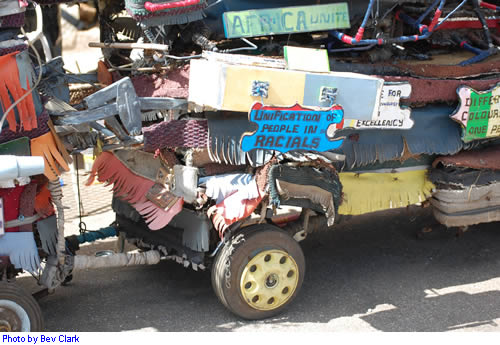Unity and the spirit of sculpture
Friday, April 3rd, 2009 by Amanda Atwood
Go to the Village Walk shopping centre in Harare’s Borrowdale suburb and the first thing you’ll see is Dexter Nyamainashe’s mobile wire sculpture.
The wire sculpture is large and intricate, and people can’t help but stop to have a closer look.
Which is part of the point. As much public installation as a work in progress, the machinery, as Nyamainashe calls it, is a mixture of heart-felt expression and deliberate attention seeking.
A composite of small, unique wire sculptures, Nyamainashe’s art is several stories high with sections covered in carpeting and bunting. Each sculpture within the piece depicts different scenes. Many are of rural African village life – pounding maize, collecting firewood, minding cattle. But others include experience from Western cultures including the US and Europe.
The mobile wire sculpture that Nyamainashe has been developing since 1994, sits on six wheels and can be dismantled into five sections. It features moving parts and flowing water. When asked where his ideas came from, or how he learnt to make the water flow and the sculptures move, Nyamainashe says, “It’s just like art of imagination. It’s always on plan. When you’re working on this it’s like you’re spirited by the Holy Spirit and you get possessed somewhere during the course of doing it.”
“The main theme is saying it’s all about uniting all people,” explained Nyamainashe in a recent interview. “I cannot see any reason why we should fight one another. We should get together and learn to share, equally and unify the world.”
He sees the purpose of his art primarily to convey a message of peace and harmony, and to get people talking. “We are seeing so many wars in other countries, worldwide. We don’t like situations whereby an innocent human being gets killed.”
But the wire sculpture is also helping Nyamainashe, 43, reach another one of his goals, to become an artist.
Life, as he describes it, is a ladder. And “in life,” says Nyamainashe, “you don’t climb five steps at one time. You start from the first, then the second. Can I say maybe I’m just on the third step. I’m still close to the ground.” Times have been hard for the artist. When he finished his O Levels in Bulawayo, he took up tree cutting. But after seven years, his business collapsed and he had financial problems. Visiting Harare, he saw artists selling their work to tourists on First Street. He had been good at art at school, and calls art his “inborn concept, from younghood up to this age.”
Nyamainashe rediscovered the talent he had with wire in school and started making wire sculptures to sell to tourists. And so, he says, “I injected myself into art.”
He gets his materials from people who see the wire sculpture and bring him materials for it. He also uses objects he collects from the ground and off cuts from places like carpet shops.
Nyamainashe has dreams for how he’d like to expand his wire sculpture. “Because so far, I have Africans, Whites and Jews. So that means there are many races left which are supposed to be put on so that the whole world is there together with all races. And then I can add onto it Hell and Heaven. And some other planets. Maybe I can work on a big moon, and put the astronauts doing something after coming from earth. Then it’s going to be a united universe at last.”
The mobile wire sculpture attracts attention – and, occasionally donations, or orders from tourists and locals. The café owner that his taken him in, and given him a permanent place to host his wire sculpture, was “anointed by God,” he says. On a good day, Nyamainashe might take home USD 30, on a bad day, next to nothing. With Zimbabwe’s economy in decline, and tourism in a slump, the bad days far outnumber the good.
But Nyamainashe holds out hope that his fortunes will change, that he’ll travel the world with his wire sculpture, and that he’ll earn enough money to marry and start a family.



 As Bev
As Bev 





